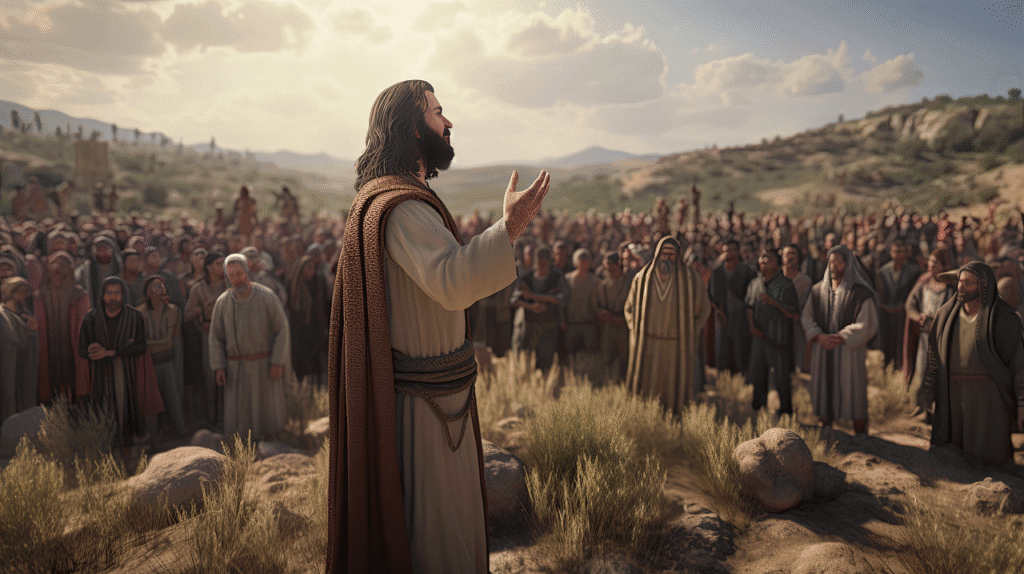Jesus Christ
✝️ Spiritual & Theological Topics
🕊️ Historical & Cultural Perspectives
🙏 Christian Living & Inspiration
🧠 Thought-Provoking & Apologetic Topics
The New Testament
Jesus Christ: Life, Teachings, Impact, and Legacy

Life and Teachings of Jesus
Jesus Christ lived a life rooted in love, humility, and obedience to God. His teachings focused on compassion, justice, forgiveness, and eternal life. His Sermon on the Mount remains one of the most influential moral discourses in human history.
👉 Read more
Who Is Jesus?
Jesus is recognized as the Son of God by Christians, a prophet in Islam, and a teacher in other worldviews. Understanding who Jesus is means exploring both His divine nature and historical context.
👉 Explore Jesus’ identity
Miracles of Jesus
Jesus performed many miracles, such as healing the sick, calming storms, and raising the dead. These miracles affirmed His divine authority and compassion for humanity.
👉 Detailed account
Kingdom of God
The central theme of Jesus’ preaching was the Kingdom of God — a spiritual reign marked by justice, peace, and righteousness, available to all who believe.
👉 Comprehensive study
Crucifixion and Resurrection
Jesus’ crucifixion is a pivotal event in Christianity, symbolizing sacrifice for humanity’s sins. His resurrection three days later confirms the promise of eternal life.
👉 Crucifixion & Resurrection
Jesus of Nazareth
Born in Bethlehem and raised in Nazareth, Jesus’ human life reflects humility. He grew in wisdom and stature, touching lives with both compassion and truth.
👉 Explore His humanity
How Jesus Changed History
Jesus revolutionized moral thought, inspired revolutions of compassion, and shaped laws, arts, and science. No single figure has transformed human civilization more profoundly.
👉 Discover His influence
Jesus & World Religions
While Christianity sees Jesus as Savior, Islam honors Him as a prophet, and other religions view Him with deep respect, often admiring His moral example.
👉 Interfaith insights
Jesus in Art & Literature
Jesus has been depicted in paintings, music, plays, and books across centuries — from Da Vinci’s The Last Supper to modern films and novels.
👉 Cultural journey
1st Century Judea
Understanding the political and social conditions of 1st-century Judea — including Roman occupation and Jewish customs — helps contextualize Jesus’ mission.
👉 Historical backdrop
What Would Jesus Do?
This question challenges believers to act with integrity, kindness, and humility in everyday situations, modeling Jesus’ love and leadership.
👉 WWJD in daily life
Jesus and Forgiveness
Forgiveness was central to Jesus’ message. He forgave His enemies and taught that we must forgive others just as God forgives us.
👉 Explore forgiveness
Jesus in a Secular World
Even in secular societies, Jesus’ moral teachings inspire movements for justice, equality, and peace, proving their universal relevance.
👉 Faith in modern times
Sermon on the Mount
This sermon includes the Beatitudes and other radical teachings on humility, mercy, and inner purity. It remains a blueprint for Christian living.
👉 Full sermon explained
Loving Like Jesus
Jesus loved unconditionally — the poor, the outcast, and even His enemies. He calls His followers to do the same in everyday life.
👉 Love as a lifestyle
Did Jesus Exist?
Scholars overwhelmingly agree that Jesus existed historically. The debate often centers around the interpretation of His life and divinity.
👉 Faith & evidence
Was Jesus God?
Jesus claimed divine status in various ways. Christian theology affirms His dual nature: fully God and fully man.
👉 Explore divinity
Jesus & Science
Faith and science are often seen in tension, but many Christian scientists find Jesus’ teachings deeply compatible with a life of inquiry.
👉 Harmony or conflict?
Parables of Jesus
Jesus used short stories with moral and spiritual lessons — such as the Good Samaritan and Prodigal Son — to teach eternal truths.
👉 Parables explained
Jesus and Prophecy
Jesus’ life fulfilled many Old Testament prophecies, including those concerning the Messiah’s birth, suffering, and resurrection.
👉 Prophetic fulfillment
Conclusion: The Ongoing Relevance of Jesus Christ
Jesus Christ remains one of the most influential and relevant figures in human history. From His humble birth in Bethlehem to His resurrection in Jerusalem, His life, teachings, miracles, and sacrifice continue to shape hearts and societies across the world. His message of love, forgiveness, truth, and grace transcends cultures, generations, and religions. In a world longing for peace and purpose, Jesus offers hope, healing, and eternal life to all who seek Him. His teachings challenge moral decay, inspire justice, and transform lives through a personal relationship with God. Even today, millions find strength in His words, comfort in His presence, and direction in His truth. Whether viewed as Savior, Teacher, Prophet, or King, Jesus Christ’s legacy remains as powerful and relevant now as it was 2,000 years ago. As He said, “I am the way, the truth, and the life. No one comes to the Father except through me” (John 14:6).
From His humble birth in Bethlehem to His resurrection in Jerusalem, Jesus Christ has profoundly influenced human civilization and continues to do so today. His presence and message transcend time, culture, and geography. For more than two thousand years, Jesus has remained not only a religious figure but also a moral compass, a symbol of hope, and a catalyst for transformation.
Jesus’ teachings emphasized love, forgiveness, humility, and truth — values that still resonate in modern societies facing moral ambiguity and spiritual hunger. Even in our increasingly secular age, His message continues to draw people toward grace, renewal, and purpose. But how exactly does Jesus Christ remain relevant in the 21st century?
1. Jesus’ Teachings Remain Morally Grounding
In a world often driven by self-interest and material gain, the teachings of Jesus provide a countercultural framework rooted in compassion, service, and humility. The Sermon on the Mount, for example, calls people to love their enemies, forgive those who wrong them, and seek righteousness above all else. Such teachings are timeless and continue to challenge the human conscience.
Whether in personal relationships, business ethics, social justice, or political leadership, Jesus’ moral principles offer guidance for those seeking to live with integrity. His command to “love your neighbor as yourself” (Mark 12:31) remains a foundational ethic for communities across the world.
2. The Power of Forgiveness and Reconciliation
One of Jesus’ most radical and enduring messages is the power of forgiveness. In a culture where vengeance, grudges, and resentment often dominate, Jesus’ call to forgive “seventy times seven” (Matthew 18:22) invites a transformative way of life. Forgiveness heals not only relationships but also the human heart.
This message is especially relevant in today’s polarized and wounded world. Personal offenses, generational trauma, and national conflicts often fester without the healing balm of grace. Jesus not only taught forgiveness — He embodied it. From the cross, He prayed for His persecutors: “Father, forgive them, for they do not know what they are doing” (Luke 23:34).
3. Hope in Suffering and Brokenness
Jesus is not distant from human pain; He entered into it. His life included rejection, betrayal, poverty, torture, and death. Yet through His resurrection, He offers hope beyond suffering. This paradox — that life can spring from death — provides comfort to countless people enduring loss, grief, and despair.
In times of war, sickness, or economic hardship, many turn to Jesus for the strength to endure and the promise of redemption. His resurrection is more than an event; it is a continuing invitation to live in the light of hope. Jesus’ words, “In this world you will have trouble. But take heart! I have overcome the world” (John 16:33), continue to comfort those facing trials.
4. A Global Impact That Transcends Religion
Jesus is not confined to the walls of the church. His influence stretches into art, education, healthcare, music, politics, and humanitarian work. Universities, hospitals, and charities around the world trace their inspiration to His life and teachings.
Even outside Christianity, Jesus is admired. In Islam, He is considered a great prophet. In secular spheres, He is seen as a revolutionary moral teacher. Mahatma Gandhi once said, “I like your Christ, I do not like your Christians. Your Christians are so unlike your Christ.” Gandhi found in Jesus a model of nonviolence and sacrificial love.
Jesus speaks across divides — religious, racial, national, and generational. His message is inclusive and radically open, extending to the marginalized, the forgotten, and the brokenhearted.
5. A Personal Relationship That Transforms Lives
For believers, Jesus is not merely a historical figure or moral teacher. He is the living Son of God, who invites each person into a personal relationship with Him. This relationship changes lives from the inside out. People who encounter Jesus often describe experiencing peace, joy, purpose, and a newfound identity.
Millions testify to being freed from addiction, healed from emotional wounds, or restored to wholeness through faith in Jesus. This ongoing transformation is a powerful testimony to His relevance. Jesus does not merely offer religion; He offers relationship.
As He said in Revelation 3:20, “Here I am! I stand at the door and knock. If anyone hears my voice and opens the door, I will come in…”
6. Jesus and the Quest for Truth
In a world plagued by misinformation, relativism, and fake news, the search for truth is more urgent than ever. Jesus’ bold declaration in John 14:6 — “I am the way, the truth, and the life. No one comes to the Father except through me” — calls humanity to an absolute truth rooted in love and sacrifice.
Jesus offers more than subjective inspiration; He claims objective reality. He doesn’t just point to truth — He embodies it. His life, death, and resurrection present a comprehensive narrative of truth that addresses humanity’s deepest questions: Who am I? Why am I here? What happens after death?
7. Jesus’ Relevance in Social Justice and Equality
Throughout history, the teachings of Jesus have undergirded movements for human rights and justice. His concern for the poor, the oppressed, and the outcast laid the groundwork for abolition, civil rights, and care for the marginalized. Jesus elevated the status of women, valued children, and broke racial and cultural barriers.
Modern advocates for justice often echo the heart of Jesus — even if unknowingly. He inspired the likes of Martin Luther King Jr., Mother Teresa, and Desmond Tutu. His vision of a just kingdom continues to drive change-makers today.
8. Jesus in the Digital and Secular Age
Though the modern world is increasingly secular and digitally driven, Jesus remains at the center of global discourse. Social media platforms host billions of posts, videos, and sermons about Him. Online Bible apps, Christian influencers, podcasts, and digital ministries reach audiences Jesus’ disciples never could’ve imagined.
Interestingly, in secular discussions about ethics, artificial intelligence, and the future of humanity, moral reference points often echo Jesus’ ideals — love, mercy, fairness, and sacrifice. Even in technology’s rise, the human longing for meaning — which Jesus addresses — persists.
9. Fulfillment of Prophecy and Apologetic Relevance
Jesus fulfilled dozens of Old Testament prophecies, including His birthplace (Micah 5:2), method of death (Psalm 22), and resurrection (Isaiah 53). This prophetic consistency strengthens the case for His divine identity and eternal relevance.
Apologists like C.S. Lewis, Lee Strobel, and Ravi Zacharias have argued that belief in Jesus is not blind faith but reasonable trust based on evidence. The growing field of Christian apologetics continues to present Jesus as intellectually satisfying and spiritually compelling.
10. The Message of Grace in an Age of Performance
Modern culture often tells people that their worth is tied to performance, success, or social media approval. Jesus flips this narrative. He declares, “Come to me, all who are weary and burdened, and I will give you rest” (Matthew 11:28).
His message of grace — unearned favor — is uniquely liberating. It tells people they are loved, not because of what they’ve done, but because of who He is. In an anxious world striving to be “enough,” Jesus offers peace and rest.
Jesus Today: Still Changing Lives
Millions continue to follow Jesus not because of tradition, but because of transformation. Whether in underground churches in persecuted nations, revival movements in Africa, youth groups in urban cities, or quiet devotions in solitary rooms, Jesus is alive and active.
People encounter Him in prayer, through Scripture, in community, and in the sacraments. They find hope in His resurrection, meaning in His cross, and purpose in His call to “Follow me.”
Final Reflection
Jesus Christ is not merely a figure of the past. He is eternally present — a Savior, Teacher, Healer, and King. His relevance is not tied to trends or technology but to eternal truths that speak to the human soul.
✝️ “Jesus Christ is the same yesterday and today and forever.” – Hebrews 13:8
As the world shifts, His love remains. His call endures. His kingdom grows. And His arms are still open wide, welcoming all who come.





